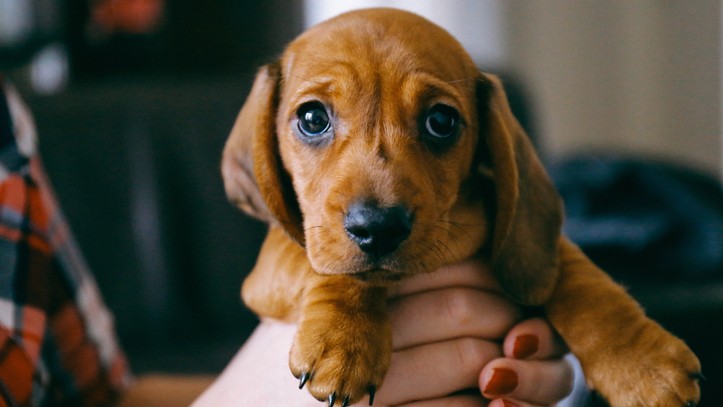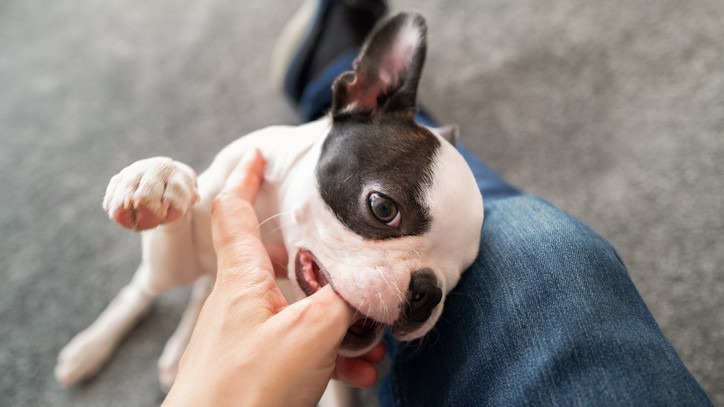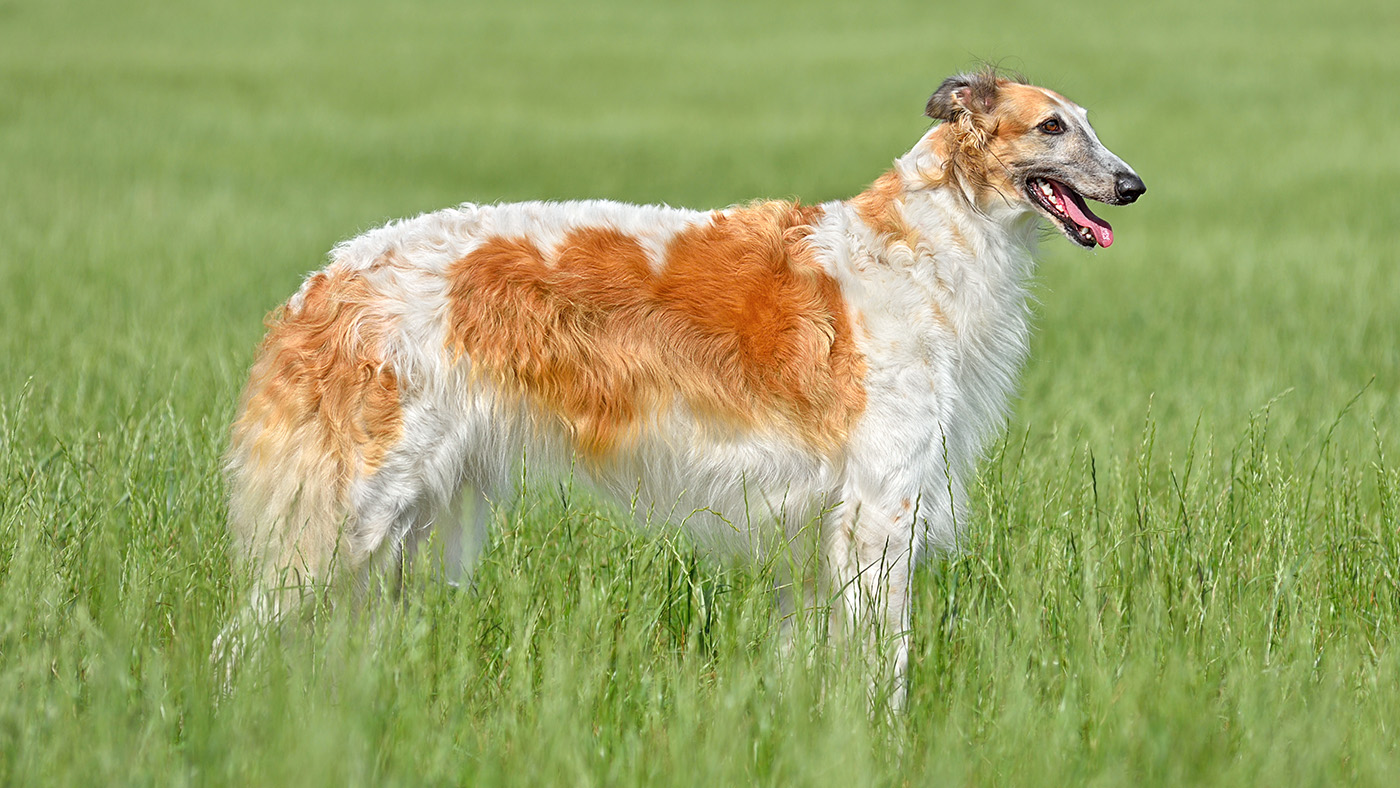Puppy not eating? Try this…
Is your puppy not eating? Read on to find about the causes, what to do, and when you should be worried

Is your puppy not eating? When you have a new pet, it’s easy to worry about every little thing, but if your puppy is not eating this can be a major concern, especially if you’ve spent time and money getting them the best puppy food. There are lots of reasons that your puppy might stop eating, but a puppy not eating is often a cause for concern, and may need a visit to your vet sooner rather than later.
What causes a puppy not to want to eat?
Broadly, reasons a puppy isn’t eating can be split into two categories – medical reasons and behavioral reasons. Behavioral reasons for a new puppy not eating include stress and anxiety, food guarding, and unfamiliar foods and experiences – all of which are common in new puppies. On the other hand, medical causes of a puppy not wanting to eat include parvovirus, intestinal blockages, and teething pain.
Why is my puppy not eating?
Let’s take a look in more detail at some of the reasons your puppy isn’t eating. This list isn’t exhaustive, but it does cover the more common reasons for a puppy to go off his food.
Diet and food
Of course, one reason your puppy may have stopped eating is because they're full. Small breed dogs in particular are prone to picking at their food and only eating when hungry. It’s probably worth checking you know how much you should feed your puppy, and that you aren’t feeding them too many training treats.
If your puppy is very new, they may also be unsure about the type, flavor, or texture of their food. This is one of the reasons it’s worth finding out what diet they were on at the breeder, so that you can give them what they're used to at first until they're settled in. Don’t forget to transition between diets slowly so as not to cause stomach upset or more confusion for your puppy.
Behavioral concerns
Puppies can get behavioral problems too, but the good news is that these are more likely to be ‘phases’, and can generally be aided with some good training tips. Stress and anxiety are common, especially in puppies that have been abruptly separated from mum. After all, a new house, new rules, and new housemates can be scary! If it’s your puppy’s first night home, they may be a little worried, and not want to eat.
Another behavioral concern is food guarding. This tends to happen in slightly older puppies, but can occur even on the first night home. It’s normal for an animal to protect their food, especially if they've grown up with siblings trying to steal it all the time. They may be too worried to eat their food, instead standing near it and protecting it. Don’t panic, and don’t tell them off. Make sure they have their own space to eat in without disturbance from other pets or people, and talk to your vet about it as soon as you can to prevent the behavior from worsening.
- Puppy food aggression: Six tips to stop it
- How to train a puppy not to bite
- How to train a puppy to walk on a leash

Teething and mouth pain
If your puppy’s mouth is painful, it’s not surprising that they don’t want to eat. Check to see whether your puppy has been losing their baby teeth, or whether they have any injuries, redness, or sores in their mouth that might be putting them off their food. If they're teething, softening their food may help. For more about teething, our article about how long puppy teething lasts explains what to expect.
Parvovirus
Parvovirus in puppies is relatively common and extremely serious. Puppies are most susceptible to parvovirus until their vaccination course finishes at 12-16 weeks, although it can occur in older puppies too. When a puppy gets parvovirus they will often go off their food. Vomiting and diarrhea usually follow, and puppies get very weak, very quickly. Parvovirus is highly contagious and, although recovery is possible, your puppy will need fast intervention and intensive care in the veterinary clinic if they are to survive.
Intestinal blockages and intussusception
Puppies are curious, exploring with their mouths. They’re therefore very prone to eating things they shouldn’t. These things can cause intestinal blockages. Dogs with a bowel obstruction will often start vomiting, and may refuse to eat.
Puppies can also be prone to a similar gut problem called ‘intussusception’, which is where the gut folds inside itself, like a telescope. This is painful, and causes a lack of appetite, vomiting, and sometimes signs of colic like looking at the belly or adopting a praying position.
With both of these problems, your puppy will need to see the vet straight away for investigations, as both can quickly become fatal.
Gastroenteritis
Of course, anything that causes nausea may cause a puppy to stop eating. One of the more common causes of nausea in puppies is gastroenteritis. This could be from a sudden diet change, eating something foul on a walk, or catching a virus. If your puppy has vomiting and diarrhea, you should call your vet, firstly to rule out more serious conditions, but also because puppies will quickly become dehydrated if vomiting and not eating.
When should I worry about my puppy not eating?
If your puppy is not eating, there may be a number of causes. While some are more serious than others, it’s best to talk to your vet to work out what’s going on. If your puppy hasn’t eaten in more than 12 hours it’s time to call the vet, even if he seems well otherwise. If your puppy is vomiting or has diarrhea as well as not eating, you should call the vet as soon as you notice symptoms, as these dogs can go downhill quickly.
How to get a puppy to eat
How can you get your puppy to eat? As long as you’re confident that there’s nothing else wrong with your puppy, and you’ve taken your vet’s advice, there are a few things you can try:
- Give your puppy some space. If they’re feeling anxious, giving them peace and quiet to eat without disturbance from other members of the household (including other pets!) can give them confidence to eat.
- Try heating the food. Hot food smells more than cold food, and might be enough to tempt your pet to eat. You can heat the food in the microwave if your puppy is on wet food, or with a little boiling water for wet or dry diets.
- Try heating the food. Hot food smells more than cold food and might be enough to tempt your pet to eat. You can heat the food in the microwave if your puppy is on wet food, or with a little boiling water for wet or dry diets.
- Take the food away. If your puppy turns their nose up and walks away from their food bowl, take their food away. Wait a few hours, then offer it again. They’ll be more likely to eat it than if you leave it down all the time.
- Make food fun. Instead of feeding from a bowl, feed in puzzle feeders or as a reward for training. Dogs prefer to work for their food, and this increases the food’s value.
If in doubt, it’s really important to get your puppy checked at the vets, even if the vet has already seen your dog, and couldn’t find anything wrong. Puppies don’t have large fat reserves to carry them through when they stop eating, so you should seek help at an early stage.
If you’ve noticed your puppy not eating, you’re right to be concerned. Although there are some situations where not eating isn’t anything to worry about, in most cases it’s worth investigating, especially if it continues for more than 12 hours, or if there are other symptoms. Puppies go downhill quickly, so it’s always better to be safe than sorry if you’re worried that your puppy has stopped eating their food.
If your puppy isn’t feeding from their mother, it might be a sign of fading puppy syndrome.
PetsRadar Newsletter
Get the best advice, tips and top tech for your beloved Pets
After graduating as a vet from the University of Nottingham, Dr Joanna Woodnutt went on to practice companion animal medicine in the Midlands. Since then, she has also written for countless online and print publications and is a regular contributor for Edition Dog Magazine.

